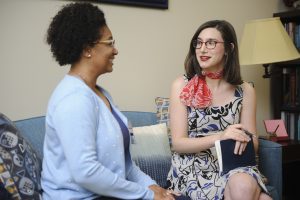By David Miller

The blueprint to aging successfully is essentially a continuation of responsible “adulting,” only with more variables and great attention to details.
There’s medicine, nutrition and financial planning, all of which are influenced by policy, physicians and specialists throughout the spectrum of health care. But one aspect of wellness among older adults is rarely talked about: sexuality.
“There is this pervasive belief that older adults are inherently asexual or, at best, monogamous and heterosexual,” said Christina Pierpaoli Parker, a fourth-year doctoral student in the clinical geropsychology program at The University of Alabama. “We find that none of that is true.”
Older adults are healthier, living longer, more diverse and sexually active than previous generations, Pierpaoli Parker said. Consequently, there is an increased prevalence of HIV and other sexually transmitted diseases in adults over the age of 50, which is driving empirical interest to better understand sexuality and aging.
Still, the effects of ageism trickle down into clinical practice. Older adults over the age of 50 typically aren’t asked about their sex life by their doctors, which creates a barrier between patients and information about late-life STDs, perpetuating sexual dysfunction and disease in older adults, Pierpaoli Parker said.
Pierpaoli Parker’s dissertation, “The Senior Sex Education Experience (SEXEE) Study,” currently in proposal, will design, implement and evaluate sex education for older adults, focusing on risk-reduction, improving sexual function, and increasing sexual health communication between older adults and health providers.
“Part of my research is to elevate clinical literacy that physicians bring to those conversations, and the other part is to empower older adults to ask more questions,” Pierpaoli Parker said. “When I ask older adults about their sexuality, some may be initially reluctant to share but most aren’t. Many more are thankful they’re being affirmed as sexual beings.”

Pierpaoli Parker said sexuality in later life is associated with increased mood, quality of life, and even improved cardiovascular health. Sexual satisfaction also appears to improve as we age, in part because of a natural undergoing of “socioemotional selectivity,” a pruning of social networks that makes intimate relationships more meaningful.
“Sex facilitates emotional intimacy and connectedness with age, which is really important as we confront an epidemic of loneliness,” Pierpaoli Parker said. “For older folks especially, sex also provides a good way of maintaining and motivating health.”
The pitch-people for older-adult wellness often reflect their target audience: a slender, slightly graying 50-something woman championing the benefits of probiotic yogurt, or a salt-and-pepper haired man walking hand-in-hand with his partner along a beach as the sun sets, indicating that “the time is right.” The faces are pretty, but they’re more worn than that of Pierpaoli Parker, whose smiling, youthful image appears with every blog she publishes. Since 2016, Pierpaoli Parker has written about various aspects of aging and health in her Psychology Today blog, “Eng(aging), A millennial’s thoughts on age and aging.”
Beyond publishing academic papers, blogging and podcasting accomplish several of Pierpaoli Parker’s goals. She promotes her own research and connects with leading thinkers in her field, like Esther Perel, psychotherapist and New York Times best-selling author of “The State of Affairs” and “Mating in Captivity,” whom she interviewed for her blog.
Blogging also has provided her a gateway to communicate with a diverse readership.
“Science excels at explaining problems and proposing solutions,” Pierpaoli Parker said. “But does less well at disseminating those solutions and sharing the ‘so what?’ parts of our research.”
“I created my blog to communicate to lay audiences and older adults themselves — to get our research out from behind the password-protected walls of the ivory tower. The goal is to empower older adults to own their aging, health and sexuality with evidence-based knowledge in hand.”
